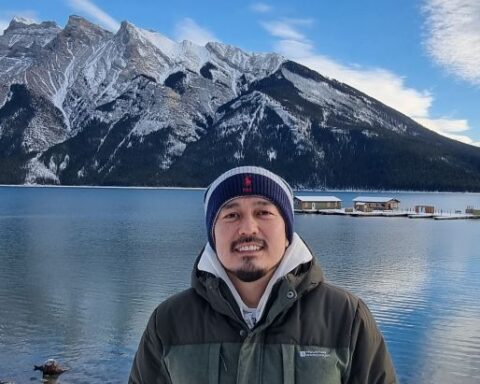Naheed Nenshi’s meteoric rise – from relative obscurity to being the new face of Western Canada – was fodder for international media when he first became Calgary’s mayor in 2010. Since then, he has orchestrated the city out of last year’s devastating flood, winning him accolades, trending hashtags, and a second term in office.
Yet four years ago, political pundits wondered: how could Canada’s arguably most conservative city elect a non-white Muslim mayor?
Nenshi – a former Harvard-educated academic – says Calgarians didn’t care much about his background or his skin colour. In fact, they bristled at anyone who did.
“The issue of my faith came up exactly twice [in Calgary], and both times there was a huge backlash against people even talking about it,” says Nenshi, his first term evidenced from the multiplying grey hairs in his messy mop of trademark curls.
“People would phone the newsrooms and say, ‘Why do I care? I want to know what he wants to do about transit. It was only after I was elected – immediately after I was elected, within hours – that I suddenly found myself being very famous. And people from outside of Calgary wanted to know about this Muslim mayor.”
Nenshi says he was reluctant to discuss his heritage at first, deeming it irrelevant to his work as the city’s mayor. Today, he admits it’s “an incredibly important part of my identity and the way I see the world.”
See snippets of the interview with Mayor Nenshi here:
Personal story
His story is not unlike that of countless other Canadians, who left their home countries in search of brighter prospects. For the Nenshi family, it meant leaving their native Tanzania in the early 1970s while the mayor’s mother was still pregnant with him.
He says he grew up wondering why his family had “big fancy citizenship certificates” and all he had was a “lousy birth certificate,” realizing later in life those pieces of paper were deeply meaningful. It was a sentiment that snowballed and soon morphed into a profound sense of appreciation for what makes Canada a beacon for immigrants.
“As minority communities, we often focus on things that could be better, such as the discrimination or lack of equal opportunity,” says Nenshi.
“We need to focus on the extraordinary place in which we live,” insisting that every child, regardless of where they come from or what they look like, has the opportunity to realize their Great Canadian dream.
“I believe I’m one of five non-white city council members ever, in history,” acknowledging his own Great Canadian dream realized.
Nenshi wants to see other newcomers looking to fulfill their own ambitions – not just for their children. In order for that to happen, he says, more groundwork needs to be done, be it through offering incentives to quit their jobs and return to school, improve their English skills or acquire accreditation in the professions for which they’ve already been trained.
“People have to be able to understand that it’s possible here and it isn’t possible everywhere,” says Nenshi. “For many of us, it isn’t possible in the countries we came from.”
Success stories
He rattles off some success stories with a deftness that hints he’d told them many times before: a man who immigrated from Colombia after being mayor in his own hometown, and found work in Calgary as a house painter, only to quit his job, enroll in college and take on an internship in city hall, which would soon lead to work in Mayor Nenshi’s office.
Nenshi then recalls meeting a woman from India who worked as an assistant manager at McDonald’s, who was able to put her son and daughter through college, yet still continued working at the restaurant for 27 years simply because she liked working there and wanted to ensure other newcomers who came after her could have the same experience.
The stories – albeit uplifting – may perhaps be a way to offset the negative publicity some of the country’s immigration programs have garnered. Chiefly, the Temporary Foreign Worker program which continues to get mired in controversy. The TFW program was designed to be a two-way street: an avenue for foreigners seeking work and a pathway to eventual Canadian citizenship, all while filling a void in the country’s labour market. Today, Nenshi says, the public perception of the program has changed.
“Now what you have is people saying Temporary Foreign Workers are not well treated, that we’ve created a second class of Canadians – people who don’t have the right to stay here,” says Nenshi.
“Now what you have is people saying Temporary Foreign Workers are not well treated, that we’ve created a second class of Canadians – people who don’t have the right to stay here,” says Nenshi.
“Those are very deep moral issues that we have to talk about.”
He says the success of Canada’s immigration system hinges on three levels: policy, programs and people.
“The [federal] government has to get the policy right – how many people do we let in? What kinds of people do we let in?” he says, adding the other two facets are even more important than getting policy right.
Settling in
Newcomers can’t walk that road alone. Nenshi says non-profit agencies, government, and immigrant-serving agencies all have a role to play in offering programs to assist immigrants settle in, from accessing language training to getting a foreign degree accredited.
Nenshi admits he may not be politically correct, but integration entails “fluency in English, reducing accents, [and] being able to get more in the workplace.” He says confronting that issue can mean wiping out other social problems that arise from it, such as generational poverty.
Nenshi admits he may not be politically correct, but integration entails “fluency in English, reducing accents, [and] being able to get more in the workplace.” He says confronting that issue can mean wiping out other social problems that arise from it, such as generational poverty.
Yet, at the heart of it all, people can make all the difference in assisting newcomers and prove to be the most vital element.
“It really is about those human linkages and human beings helping one another think about better ideas,” he adds.
He says he’s “very optimistic” the community will tap into its full potential and continue to welcome immigrants, in spite of “little strains of xenophobia that have crept into the conversation.”
Case in point: Quebec’s controversial Charter of Values, a bill that was famously proposed by the former Premier Pauline Marois in 2013, which restricted government employees from wearing religious symbols, such as turbans and hijabs.
“The fact that the ‘Charter of Racism’ (as I call it) was voted down soundly in Quebec says a lot about who we are as a community,” says Nenshi. “It’s because people fought against it and stood up and said, ‘That’s not right. That’s not the Quebec we live in, that’s not the Canada we live in, that’s not the world we want for our kids.’”
“We have to keep doing it every single day or we risk sliding backwards,” he adds.
Nenshi says he’s heartened by the strides made in Calgary, suggesting the city may truly be colour blind – or at least partially.
“Those of us who are minorities learn to live with it and we learn to overcome it,” he says, citing his own Member of Legislative Assembly, Manmeet Bhullar. “[Bhullar] is a large man with a beard and a turban, and nonetheless is the Minister of Human Services.”
“I think that speaks incredibly well of our ability to move forward.”




